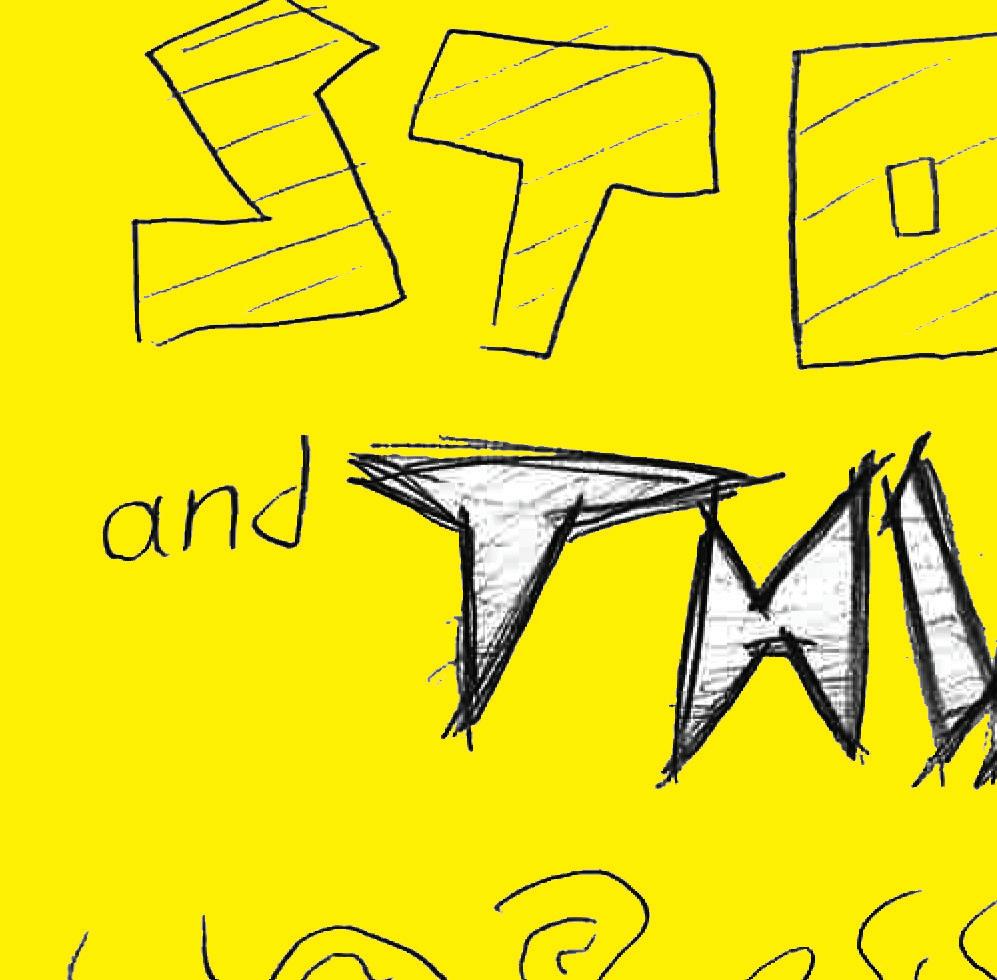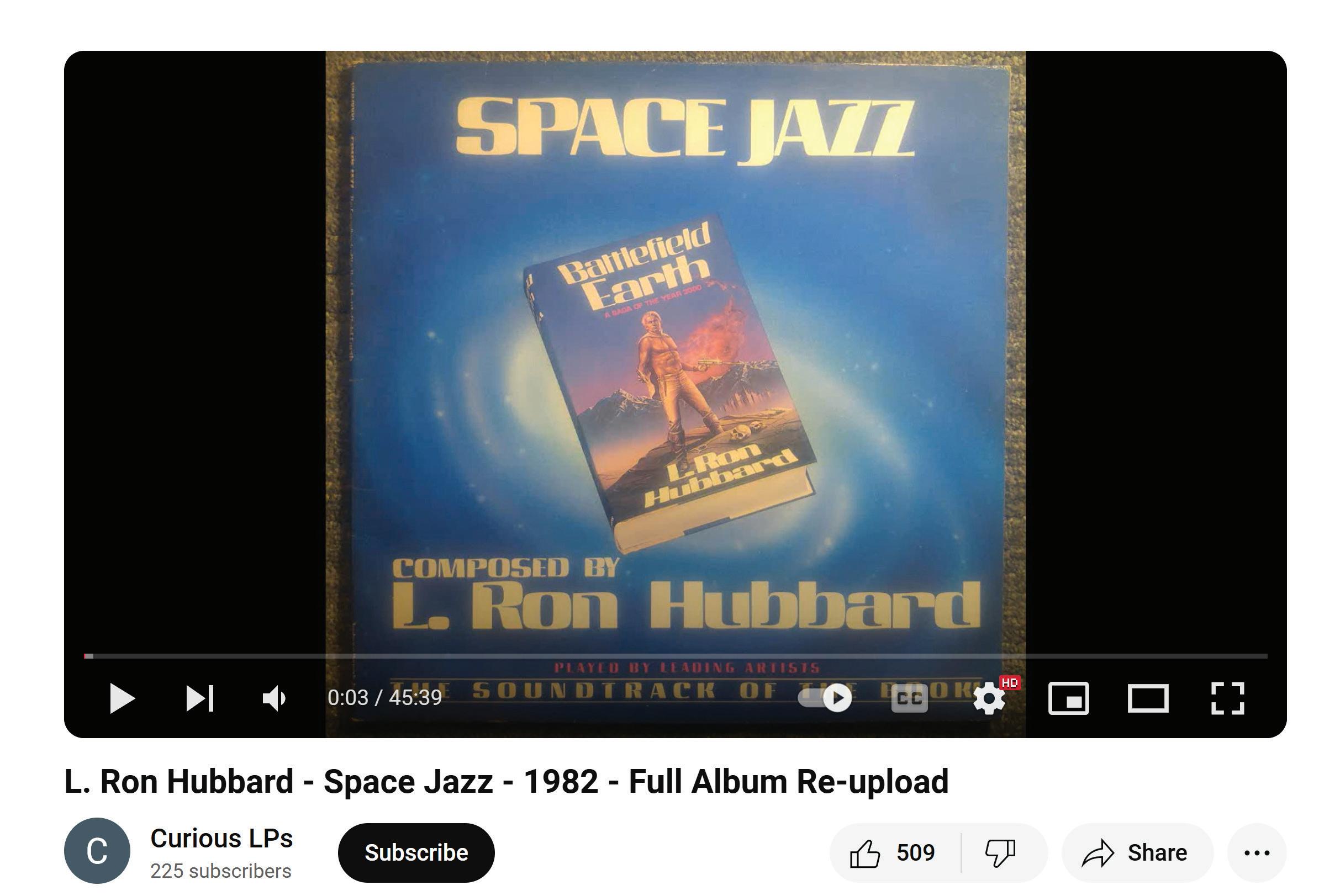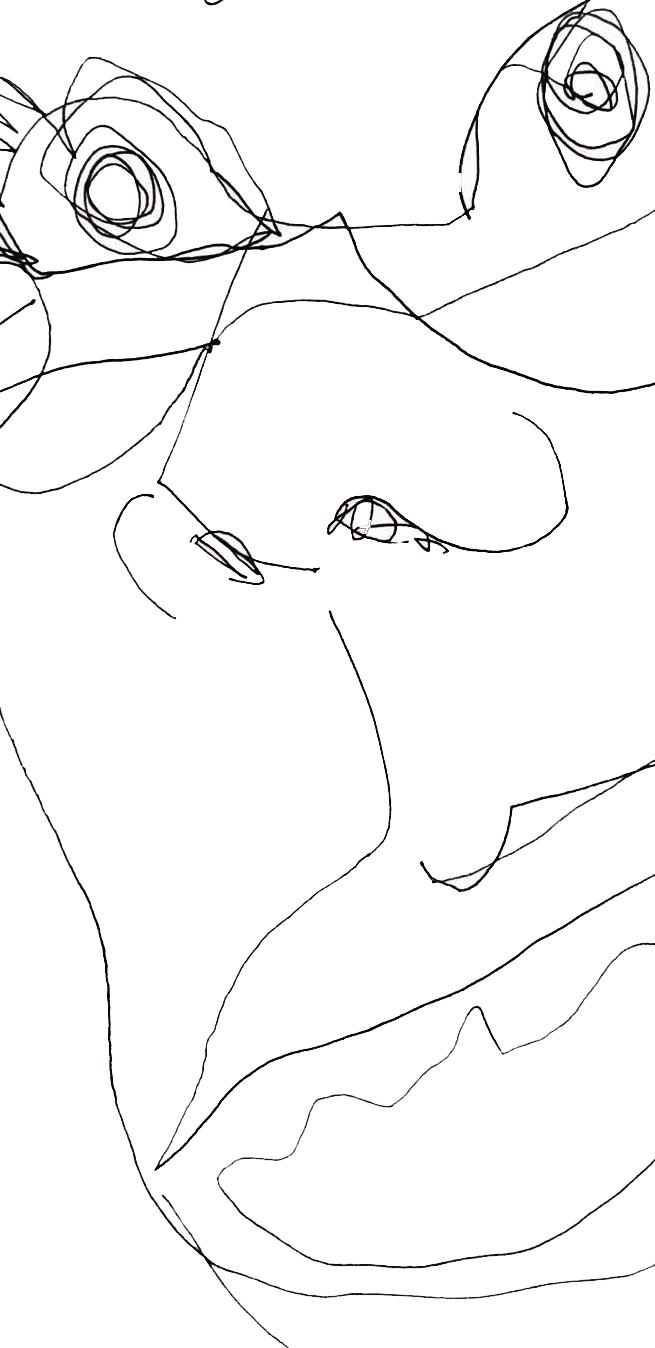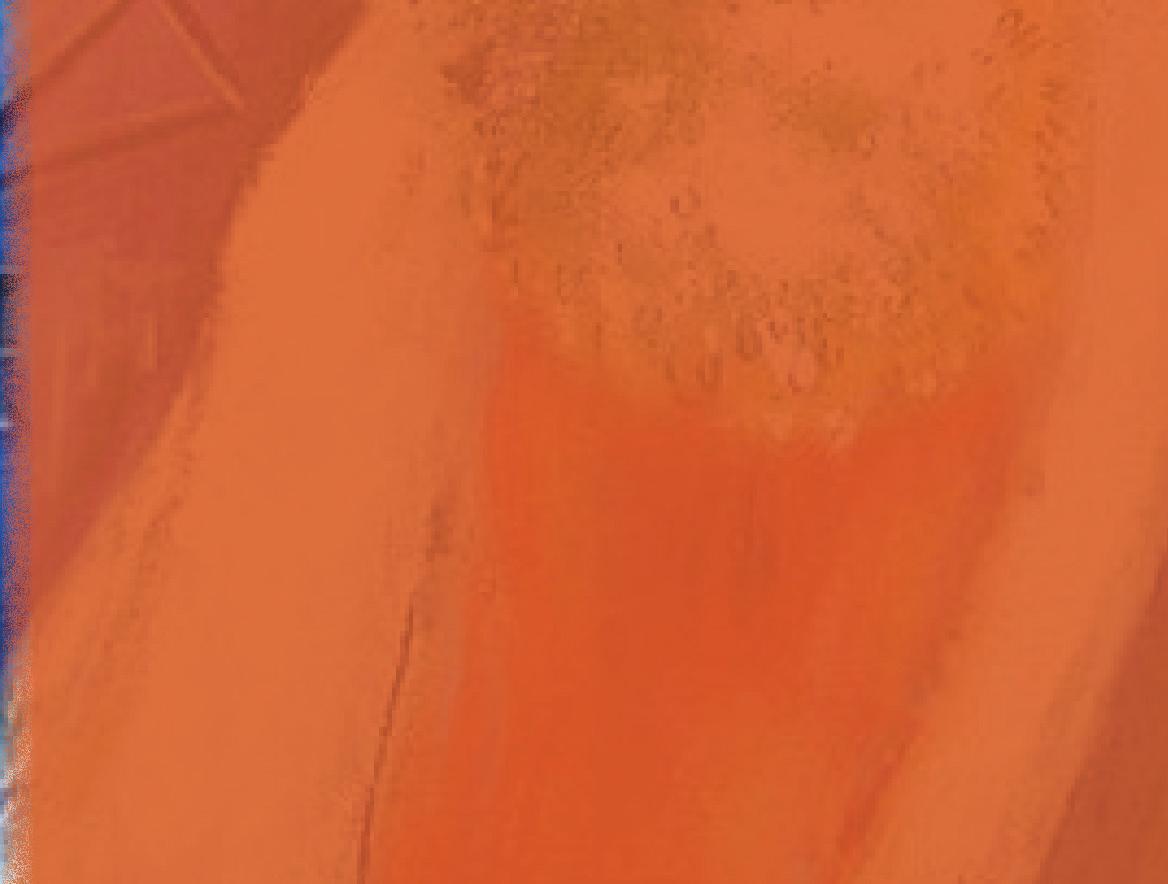




















Ethan Whiteaker, Adiana Contreras, Stewie Goon, Lizzie Coy-Bjork, Dario Rissolo, Jimmy Carlson, Percy Vermut, Kaya Shin-Sherman, Nicky Pierce-Ralph, Sofia Durdag (ed.) Calla James Ruff, and everybody who drew in the KRLX Community Notebook.





this issue is very special. first, it might be the longest edition of no fidelity that i’ve presided over. second, we have a statistically significant amount of contributors whose names have hyphens in them. and third, this issue marks the return of the krlx community notebook! much of the art you see in here was drawn by krlx djs—and probably in the middle of the night, too. but nofi contributors also wrote about so much fascinating stuff: scientology, the boss, maine (my beloved home state!!), Midwestern despair and SO MUCH MORE! some weird things went down this term, but nofi is truly better than ever.
If this is your first issue, welcome. NoFi is open to all students interested in or passionate about music, pop culture, and is open to all varieties of submissions. Email durdags@carleton.edu with questions, inquiries, etc.
[sofia durdag ‘25]

Dario Rissolo

Many reviews of records as bad as L. Ron Hubbard’s Space Jazz will tell you not to listen to the album. This is not one of those reviews. I need someone else to listen to this album, if only for the solidarity of having been through such an experience.
L. Ron Hubbard is better known as the originator of Scientology, but he began his career of grandiose metaphysical speculation by writing science fiction stories at the salary of a penny a word. In 1982, having successfully established a nationally infamous cult, he decided to return to his roots and penned his magnum opus: a 1,050 page space opera called Battlefield Earth. Hubbard also decided to compose a soundtrack for the book, and now I have to listen to it.
The album opens with the track “Golden Era of Sci Fi,” in which a chorus of what sound like high school cheerleaders belt out the names of Flash Gordon, Buck Rogers, and Superman with resounding cheers, in an apparent attempt to place Hubbard’s progeny Jonnie Goodboy Tyler, who is otherwise devoid of personality, among the pantheon of science fiction heroes. Mercifully, I have not read the book, but Jonnie is apparently one of the last humans after an alien race (called the Psychlos, obviously) invaded Earth to mine for gold. Jonnie has a horse named Windsplitter (obviously) who lends its name to the highlight track of the album, which features as much neighing and clopping and grunting and trotting as you could possibly want in a song.
At the time, Hubbard had become enamored with the recently released Fairlight Computer Musical Instrument, or CMI, a digital synthesizer utilized by the likes of Kate Bush and Peter Gabriel. It might surprise you to learn that Hubbard did not share their musical prowess. Most of the songs end up sounding like the bit-compressed soundtrack for a space-themed Flash game, which I sorely wish they had made instead. In keeping with the whole charismatic-cult-leader thing, Hubbard considered himself a visionary, and proclaimed nothing less than the creation of an entirely new genre, Space Jazz, which he presumptuously took as the title of his soundtrack. This genre, according to the text on the back of the sleeve, “antiquates past music like the cathedral organ wiped away blowing on a blade of grass,” a claim that would be extravagant attached to almost any other project, much less one immediately relegated to the record collections of tone-deaf Scientologists. Repeatedly throughout Space Jazz, Hubbard appears to have taken every sound effect on his computer, thrown them at the wall to see what would stick, and then glued everything that didn’t stick back up on the wall. “The Banker,” a song that seems to taunt you for having listened that far into the album, is covered start to finish in chewing sounds (I think the bankers eat the money??), tying it up with a horrific swallow right at the end. Even the veteran studio musicians Hubbard recruited, who just happened to exclusively be Scientologists, including Chick Corea and Nicky Hopkins, were unable to save the record from sounding like a live recording of Hubbard learning how to use the CMI.

Occasionally, such as in the middle passage of “March of the Psychlos,” which could almost be the soundtrack for a Star Wars amusement park ride, you will think to yourself that maybe this album isn’t so bad. And it isn’t. These are, after all, talented musicians using an exciting new musical technology, and this naïve delusion will last about thirty seconds before Ron adds a big mess of growling and groaning sound effects and brings you back to Earth. If the Psychlos’ cartoonishly blunt chant of “kill! kill! kill!” is any indication, Earth is not such a fun place to be.



by adiana contreras


TThese guys played at The Cave in like the early 2000s or something, I forget when. Think you’re ready for this song? You could never be. I know this because I am an information infiltrator. I am a brothel house figure skater. I’m playing bingo on my calculator. Shooting up gravy with a secondhand turkey baster…


From an Argentinian band, this song combines bright steel drum-like synth and high-pitched indie pop guitar for a hybrid and unique island sound—they even use a sampler?! This song is SO good, this band deserves so much more attention it’s painful.
Radiohead-esque vocals (eh, kind of?) meet impressive staccato guitar in this song off an 80’s UK pop inspired album. He’s only got one EP from 2015, so don’t like it too much.
Jangly guitar, nice slow beat, trumpet section, and a shoegaze climax all recorded live on a tape machine… and you say I ain’t ever showed you any countrygaze!




SFrom a Chilean band, this is a certified banger for fans of heavy backing guitar, bright synth additives, and the Spanishlanguage indie boy accent (it exists). Don’t ask me why he sings “la lala la laaa” at that one part, I couldn’t tell you.
Indie rock instrumental track so nice you won’t believe it was birthed in the killed-dead city of Los Angeles.

Basically underground Sufjan Stevens, if Sufjan Stevens was nonbinary and British. The artist describes the album as “folk music for rhizomes—for the flowing Broads”. Man I hope that’s me.
Some Bandcamp tags: alternative argentina, dream pop, noise rock, noisepop, pop raro, post-rock shoegazing. If you’ve ever heard the phrase “that good stuff”, this is what they were referring to.




WHardcore punk straight outta Birmingham, Alabama. Oh yeah, we’re banging heads. Oh yeah, we’re moshing. Oh yeah, we’re
Deftones, straight outta Birmingham, Alabama. No seriously, if you like Deftones this is for you. Yeehaw!

You may think you’ve heard pop, or that you’re a fan of pop, but the hard truth of it is you’ve been drinking pop from a Britta. This band from Costa Rica has that pure strain; this song is 100% pop, straight from the teat. Orinando contra el viento



by Percy Vermut
Why I, an indie fuck, listen to Bruce Springsteen, and why you should too.












The Boss” is probably not the first person who comes to mind if you were asked to name an artist that an 18 year old in the US listens to in 2024. He’s definitely not the first person who comes to mind if you were asked to name an artist that had a highly publicized interracial homoerotic friendship in the 1970s and 80s in America. He might not even make the list. I’m here to convince you that he should, and tell you about a different side to Bruce Springsteen that you might not have heard before. Springsteen started releasing music in 1973 after signing with Columbia Records. Born and raised in Long Branch, New Jersey, Springsteen has often been credited with spearheading “heartland rock,” a subgenre of rock that focuses on the experience of the bluecollar worker with a tinge of rhythm and blues. His lyrics have often been reflective of the everyday American’s strife and experiences, and critical of the conditions of the working class person and “American values.”
This is especially evident in his 1984 album Born in the U.S.A., which subverts the ultra-patriotic expectations created by its album cover and title. In this album, Springsteen touches on a variety of topics that one might associate with a more alternative sound, contradicting his all-American image. The titular song, “Born in the U.S.A.” is in fact a protest song, criticizing the drafting of young men into the Vietnam war. It’s a complicated song, as is Springsteen’s relationship with the United States. While the chorus proudly proclaims that he was “born in the U.S.A,” the verses outline the seeming inevitably of being tangled up in the military industrial complex and the subsequent harm that comes from that. It’s an energetic, loud song and doesn’t shy away from percussion or playing with dynamics. On top of having complex, critical lyrics, it’s just a really fun track and a great opener to the album. Now, I’m not going to force you to go through every line of every song of this album with me, as I already know that won’t prove at all helpful in my goal. I will tell you that “Dancing in the Dark” is one of the greatest songs ever written about losing your sense of self and purpose, and incredibly fun to dance to on top of that.
If me waxing poetic about Born in the U.S.A. wasn’t enough to sway you, then let me tell you a little bit about “The Streets of Philadelphia.” This song was written by Springsteen for the film Philadelphia, and centers on the experience of a man with AIDS. The lyrics stand on their own even without the added context of the film, with verses such as “Ain’t no angel gonna greet me // It’s just you and I my friend // And my clothes don’t fit me no more // A thousand miles just to slip this skin.” Released in 1993, Springsteen is among a few mainstream artists who wrote about the AIDS crisis while it was happening, despite being relatively separated from it. There’s something just really special and important to me about his solidarity with the gay community, especially during the 90s, and while being regarded as a mainstream pinnacle of Americana rock.
On the topic of Bruce Springsteen and homosexuality, every part of my body is compelling me to talk about his incredibly close friendship with Clarence Clemons. I foreshadowed this in my intro, but that was just the tip of the homoerotic iceberg. Clemons was the saxophonist of the E Street Band, Bruce Springsteen’s instrumental backup. Springsteen and Clemons had an incredibly close friendship, which they talked about often in interviews and Springsteen covered in his autobiography. Throughout their career, Clemons and Springsteen would often kiss on stage, and were very publicly affectionate with each other, from the late 70s through the 90s. This is incredibly sick for multiple reasons, notably their bravery to engage in a homoerotic and interracial friendship in front of thousands for many years. Their love for each other, whether platonic or romantic or another secret thing, was never in question. After Clemons’ passing in 2011, Springsteen said that “losing him felt like losing the rain,” (Springsteen on Broadway).
Tl;dr: YOU should listen to Bruce Springsteen because his music rocks, it’s critical of the US and the military industrial complex, and he was (and still is) pretty gay.


by Calla James Ruff



We all know who Noah Kahan is. Stick Season guy who’s just kept expanding the Stick Season universe for the past two years since it came out in October 2022. He complains about being from Northern New England (Vermont, but as a Mainer, I deign to claim him too) and seasonal depression and the inability to escape the small town one comes from. As soon as Stick Season came out, people all over went crazy, finding relatability in his lyrics even if they themselves were not mean because they grew up in New England. (I use this as justification for my mild yellow-out level road rage.) In 2024, getting tickets to his shows is an arduous task involving luck, over $100, and enthusiasm for huge impersonal stadiums where you have to be in the 1% to be able to see the stage.








Just two years ago, though, this was not the case. My best friend from high school, Nola, accompanied me to a show at the State Theater in Portland, Maine, a theater where I’ve also seen Bernie Sanders, the Russian Ballet, and Hippo Campus, among others. It’s the type of theater where there are seats, but the majority of concert-goers stand in an open area with equal opportunity to fight their way to the front, just below the stage. The evening of the concert, Nola and I showered at her house after crew practice and got noodles downtown, then waited in line to get in with our $30 tickets on my phone. We secured spots near the front on the far right side against a barrier where we could see Noah walking towards the stage after his unmemorable opener. At the time, I hadn’t caught up on Stick Season. It had come out the week before and I hadn’t had time to listen all the way through and intimately know the lyrics of every song. Instead, I was there out of a long-standing love for Noah’s music that began in November 2019 during my freshman year of high school with the song “Cynic.” At 14 years old, it spoke to me. My parents had recently divorced, I’d just started high school at a new school in Portland, and the Hollywood sign didn’t catch my eye anymore either (or at least the allure of spending time in Maine’s biggest city).




The rest of Busyhead, his debut album from June 2019, followed. “False Confidence” and “Busyhead” stuck out the most as my freshman year turned remote when covid came in spring. I could dance in my room or go for walks to them and be sad. I could share them with my sister and be cool. We could dance together in the kitchen and be a little less sad. And in May 2020, “Cape Elizabeth” came out.
I am not from Cape Elizabeth. The stereotype of Cape kids at other schools in the area is rich and snobby and misbehaving. The town itself has several beautiful beaches and the famous Portland Head Light, but growing up an hour away from Cape (which is just south of Portland), with bigger and less populated beaches much closer, I find myself snooty about Southern Maine, preferring the Midcoast area that I come from.




And yet. Noah wrote about Crescent Beach State Park, sang wistfully for my beloved home state. “Maine” was the first of his songs to make my yearly top ten songs on Spotify. Whenever I leave the state, as I did for semester school my junior fall and I do now in college the song reminds me of all I have to look forward to back at home. In May of my senior year of high school, when I was out of classes for my senior project, I spent all my free time at Crescent, reading in the chill and coming to understand why he loved it. It still doesn’t rank for me when put next to beaches like Reid or Popham, but it has its own unique peace to it, memories that make me homesick out here in the Midwest.







I’d barely listened to songs off of Stick Season when I saw Noah in Portland in 2022. It’s a beautiful album full of emotion and longing and processing and coping, and I relate strongly to many of the themes he sings about. There’s a reason he’s so popular—his artistic voice is distinct, yet general enough to reach a wide audience, while still making New Englanders feel seen and special. For this I love Stick Season, but I also miss the Noah of Busyhead when he was a small struggling artist traveling and making music that ten people listened to, songs that were so raw that he might as well have handed the listener his journal and invited us to read his scrawl.
But I will never forget the way it felt to sing “Maine” with Noah and hundreds of other Mainers, right at home, in October 2022. There was a sense of deep connection and community that we got to scream along into the ether, as one. My parents from away don’t quite understand the strong identity that most kids raised in Maine have. But everyone in the State Theater that night did.




Flash forward to Fenway Park, July 2024. My sister and I have spent over $100 each on tickets, we’re far away from the stage, and we’re surrounded by Massholes. When Noah plays “Maine,” he’s not thirty feet away, his voice contained in the old structure of the State and the passion of Mainers, but broadcast out across the city of Boston to any old Masshole who romanticizes their warm seasons spent in expensive Maine summer houses, empty the rest of the year. (I once again find myself wishing for the Busyhead years when they couldn’t be bothered with him.) It’s my sister’s first Noah concert, and the time spent with her, sharing the experience, is magical. We’ve kept Noah between us for years, connecting over his music when we couldn’t agree on anything else. I only wish she’d been there with me the first time.


If you could put one song on a mixtape sent to space for aliens to find, what would it be?
American Idiot by Green Day Simon Glassenberg
Fly Me to the Moon by Frank Sinatra, Count Basie David Appel
Why iii Love the Moon by Phony Ppl
Money Machine by 100 gecs

Tabitha Kisker
Teddy Smith
Crystal by Aphex Twin Matt Sigmond
Wolf in the Breast by Cocteau Twins
Calling Occupants of Interplanetary
Craft by The Carpenters
Seven Years In Tibet by David Bowie
1999 by Prince
Pink Pony Club by Chappel Roan
Percy Vermut
Sofia Durdag
Ethan Whiteaker
Bea Culligan
Pranav Khadkikar


Ophelia by the Lumineers
River and Roads by The Head And The Heart
Kids by MGMT
Call Me Maybe by Carly Rae Jepsen
Time in a Bottle by Jim Croce
Sky Full of Stars by Coldplay
Drive Home by Steven Wilson
Pumped Up Kicks by Foster the People
Octopus’ Garden by the Beatles
1979 by the Smashing Pumpkins
American Pie by Don McLean
Electric Feel by MGMT
Megan Haack
Lizzie Coy Bjork
Teddy Smith
Percy Vermut
Sofia Durdag
Pranav Khadkikar
Ethan Whiteaker
Olivia Bremer

Maddie Selinger
Nishant Mistry
Charles Millard
Clara Alexander
by Ethan Whiteaker
Sparse, reverberant, and nostalgic. “Passenger Seat” by Death Cab for Cutie from their 2003 release Transatlanticism is all of these things in absolute. Ben Gibbard, vocalist of Death Cab for Cutie, perfectly narrates a story of a memory that you hold onto more than any possession. Using the backdrop of the rural roads and late night drives, I feel like the song mirrors many memories I too hold dear.
is all of these things in absolute. Ben Gibbard, vocalist of Death Cab for Cutie, perfectly narrates a
































I cannot bring this song up without mentioning the best part, the bridge. Gibbard opens himself up, saying he will support his partner in all facets of life. Then, the song breaks your heart. “For all time” stabs your heart with a pang. A Bb augmented chord resolves to B minor back to our home key of D major. This Bb augmented chord destroys me every time I listen. I know it will appear, yet it tears me to pieces. Gibbard wants to portray this perfect memory and describe a moment of bliss, of romantic purity. And it is all too human. The augmented chord hits after hearing only major diatonic sounds up until this point, pointing to our inability to say with certainty that this is forever. For all time hurts, but we say it with passion anyways, hence the repetition of the line that feels slightly more melancholic but in a yearnful way.
slightly more melancholic but in a yearnful way. inflection. The song succeeds in being a hit single through its simple but evolving form, timbral contrast, and lyri-
After this moment, the song ends with the opening melody feeling much more aching, almost the memory of past forevers overtaking the present joy, but I believe this song to be more hopeful than that. The nostalgic quality of the scene with the lyrics of complete trust overpower any pain that might come. I believe that, to Gibbard, this moment overshadows any future pain, and we have no need to fear it. “The world doesn’t matter” when I am with you. We breathe the moment in and imagine it to be forever. Because it is.
“We Laugh Indoors” is the third song on Death Cab for Cutie’s The Photo Album from 2001. The track most notably features the recurring line “I loved you, Guinevere” along with many early 2000s indie rock idioms including a driving drum beat, a clean lead guitar line, and overly honest lyrics performed with a slightly head-voiced inflection. The song succeeds in being a hit single through its simple but evolving form, timbral contrast, and lyrical variance in response to formal and sonic changes.



“We Laugh Indoors” is the third song on Death Cab for Cutie’s from 2001. The track most notably features the recurring line “I loved you, Guinevere” along with many early 2000s indie rock idioms including a driving drum beat, a clean lead guitar line, and overly honest lyrics performed with a slightly head-voiced inflection. The song succeeds in being a hit single through its simple but evolving form, timbral contrast, and lyrical variance in response to formal and sonic changes.
“We Laugh Indoors” is the third song on Death Cab for Cutie’s The Photo Album from 2001. The track most ing a driving drum beat, a clean lead guitar line, and overly honest lyrics performed with a slightly head-voiced invariance in response to formal and sonic changes.

The track follows an A A A’ B C A A’ structure, which I will outline momentarily, that grows in intensity to the C section and then reduces back to the initial roomy sound. “We Laugh Indoors” starts with the drums, a pattern which only changes at 2:36 in, followed by the lead guitar line, which also stays consistent throughout until 2:36 with the exception of an interlude section that plays multiple times between verses. The lead guitar line is outlining the song’s key of B minor while the bass drum pattern is syncopated. The bass drum helps drive the song during the spacious verses and gives a sense of uncertainty to where the song may go next. The simple, spacious clean guitar line is contrasted by the loud drum part in order to raise the feelings of uneasiness in the listener and raise a question as to if the song will get heavier.
The A A A’ refers to three verse structures with small interludes between them. The A’ is marked as such because, while the instrumental stays the same, the lyrics change to the repetitive line, “I loved you, Guinevere, I loved you Guinevere, I loved you” that is sung eight times before the bridge. The vocal part of A’ prefaces the song for change, acting as an intermediary entity between the verse and bridge sections, as there is no real chorus or refrain. During the last line of A’, the drums and guitar swell, with the guitar adding distortion to its sound and playing octave power chords instead of single note lines. The B section also sees the vocalist getting overdrive added to his voice in the studio version. The B section, from 2:36 to 3:08, features a [B-flat - B - G# - A] progression that is completely chromatic after the first four bar pass of the pattern instead of just two chromatic halves. The chromaticism is used to amplify the uncertain and angular feeling that the song is building up through the A’ and B sections.
The progression resolves to a G power chord before the C section, the flat six in the key of B minor which propels the listener to want some resolution. The song answers this want for resolution with an instrumental rock out section.
At this point, the vocalist drops out which allows the instrumentation to be the focal point. The C section sees the drummer using the crash symbol on each beat of a two bar form, except for beats three and four of the second bar where he fills instead. The guitar part is a mix of a single line that emphasizes a G and D, the flat five and minor third of B minor, and a sustained A on the end of the phrase, the flat seven of B minor. The guitar part intersperses the single line with palm muted scratches, which makes the section feel like a mix of the A and B guitar parts. The guitar flows seamlessly into the A section part, where the drums follow suit, and allows the C section to faze out. The vocalist comes back in for a verse, but then he reintroduces the Guinevere lyrical theme to end the song. An abrupt ending occurs, and all the instrumentation fades out.
The song succeeds in being an indie rock hit single because it balances the expectations of the listener for a more calm and consistent song in regards to dynamic contrast, what Death Cab for Cutie had done on their past two albums at this point, and challenging those expectations with a loud, abrasive middle section that settles back into their normal formula. The repetitive form elements allow for the listener to follow what is going on while anxiously awaiting for the distortion to come in and rock the house. The variation in tone, primarily on the guitar but also to some extent on the vocals in the recording, highlights the form changes and creates a natural ebb and flow to the song, just as the vocalist narrates his love of Guinevere into anger and back into love. The song succeeds as a whole because all the elements, from the lyrics and instrumentation all the way down to the form, move together with the story of the song in mind which idealistically connects to the goal of an indie rock song—personal storytelling with beautiful melodic lines mixed with distorted elements.









by Sofia Durdag


From November 6th to November 11th, I listened to only one album, over and over. I listened to it in sequence, picking up wherever I left off. I listened to it walking to and fro Lilac Hill, washing the dishes, doing homework, as I fell asleep. By conservative estimates, I most likely listened to the album in full about thirty times. I had retreated, hermit-like, from news or social media, and listening to Piper Oz the Hound perfectly filled the this absence with warm, country-tinged seventies pop rock. Piper Oz the Hound by Art Lown was released in 1977, and was his only album. For a long time, his work was almost impossible to find, and it was only uploaded to streaming services a couple years ago. But Piper Oz the Hound is a true no-skip album with lovely, yearning lyrics that reward repeat listening (and by God, did I repeat listen), and excellent instrumentation with plenty of steel guitar. Everyone should listen to it incessantly as a way to process the horrors of the world.


After I discovered Lown’s most well-known song, “Knew You Well”, I chased down the full album on the night of November 5th. “Knew You Well” is wistful, gentle and just the right mix of vintage pop-country-rock that is perfect for almost any occasion. There are a few more funky, high-tempo songs on the album that were particularly useful for propelling me up the steep hill to my house, or cleaning my kitchen, like “Power of Rain” and “Deep Blue Sea”. The eponymous song, “Piper Oz the Hound”, which is upbeat and lilting, for some reason makes me think about the Chagall painting featured in the romantic comedy Notting Hill.
My favorites from the album are the most country-inflected, with just the right amount of the honky-tonk Bakersfield Sound. “Going Back to Carolina” contains the wonderfully futuristic line, “Kelly’s got a moon in Scorpio”, and has a classic country conceit, as Lown leaves smoggy Los Angeles and returns home, hoping to see his hometown sweethearts. It’s also super catchy. I just love it! “Please Don’t Tell Me That You Love Me” and “I’m Amazed” pair well as ruminations on doomed relationships, and both have a hint of Buck Owens or Roger Smith. “Only Woman” has a jaunty, early Beatles sound, and “What It Takes to Make You Love Me,” the album closer, is a perfect distillation of what I love about this album—it feels natural but never lazy, and sunny without ever feeling saccharine.


tl;dr: Piper Oz the Hound is an excellent country-inspired pop-rock album full of longing, with a psychedelic, funky savor to it. Give it a listen!


my favorite song

by nicky pierce-ralph my favorite song goes like do do do do do dooo do dooo and the drums go buh tss ka tss buh tss ka tsska and the bass does something like plonk plonk plonk i think and when i dance to it i go like WHOOAAAA WHOOAAAA and uhhhh yeah.
by Jimmy Carlson

This image, featured in the art for Cool World, portrays Oklahoma, but it could just as easily be Northfield if it had a megachurch.
Have you ever gone a couple miles outside Carleton, around the Dundas border, and seen the way the town changes? The way the houses retreat from the highway and the consumer centers get taller and wider, carving out bigger niches in their outlines of dead grass? Maybe you’ve traveled here with a goal in mind, getting some snacks from Aldi, some laundry detergent from Target, or a cheap bottle of vodka from MGM, and some hangup stopped your errand just long enough that you had to step back a second and take a look around you, really engage with your surroundings. What did you see then? Was there mercy for your moment of confusion among the asphalt and parked cars, or the storefronts they were there to feed? Imagine what it would be like to be stuck here without a car, a shopping list, or a full wallet. If you’ve lived in or visited the Great Plains outside of Minnesota, you probably understand that this selectively accessible architecture is the norm for so much of this country. I got to spend a weekend in Missouri this term, and almost every urban center on the way there looked just like this. As a Bay Area native who’s never felt truly at home in the Midwest outside the Carleton bubble, thinking about the unforgiving suburban environments that carve their way through so much of America can turn into an existential crisis real fast. I have found no better soundtrack for this specific sense of hopelessness than the music of Chat Pile.
Chat Pile are a metal and noise rock band from Oklahoma City whose name refers to the great toxic piles of crushed rock (“chat”), byproducts of lead and zinc mining, that you can find driving through the northern half of the state. Their sound, which sits most basically between Acid Bath, The Jesus Lizard, and Korn, reflects the crushing, uncompromising nature of these piles. Drummer Cap’n Ron and Bassist Stin lay the grinding, primitive, sometimes mechanical sludge/nu metal foundation, while Luther Manhole’s guitars either fill the air with teargas noise rock strumming or double down on the heaviness Korn-style. The touchstone is the vocals of Raygun Busch, which through listless rambling and lunatic howling, all very intelligible, face the listener with delirious accounts of oppression, violence, and misery over the backdrop of the Southern Plains. It’s an instantly identifiable sound, and it’s a unique experience to listen to in studio or live (I saw them in the cities on the 6th and it was incredible, especially post-election).
On October 4th of this year, Chat Pile released their follow-up album Cool World, and gave us ten new odes to all-American suffering and evil.


Chat Pile released their first album God’s Country in 2022. It proved that their demented approach to music could produce songs with great artistic and entertainment value, and it was a huge critical and commercial success. I was personally introduced to the band by Anthony Fantano’s glowing review. The songs on God’s Country were bold, especially on the blunt force trauma and seething political directness of openers “Slaughterhouse” and “Why,” and every one of them was memorable.
Cool World sees Chat Pile take after the dynamite formula of their debut in many ways. The first track, “I Am Dog Now,” might begin with shimmering atmospheric effects, but it soon devolves into dissonant bass groovage and frantic wailing, half of which is just the song title repeated over and over (read, “I love this song”). This repetitive aggression and descent into insanity is typical Chat Pile and remains a constant for the rest of the album, but the band introduce something new with the next track, “Shame.” The beginning sounds like “1979” by The Smashing Pumpkins on acid, and the rest is dominated by lamenting melodies and spoken word, broken only by a passionate screamed bridge and a sprinkling of death growls. It’s the most purely sad Chat Pile song yet, matching its descriptions of the ongoing genocide in Gaza, and the guilt of living in a nation that finances it.



The album really hits its stride with “Frownland,” a deranged but oddly accessible cruncher about self-isolation. The momentum holds with “Funny Man,” which inhabits the mind of a soldier who feels obligated by past generations to kill for his country, and envisions the same life for his children.

The verses here feel a bit syllabically dense and selfcaricatured, but the rest is an immersive pummeling nightmare. The longest song at six minutes is “Camcorder,” which occupies the same slow-burn haunting space that “Pamela” did on God’s Country. It works, but it’s not quite memorable enough for its length. Things return to form on the other film-themed track, “Tape,” which has the most dynamic songwriting on the album.
The best two-song sequence on Cool World is “The New World,” followed by “Masc.” The former concerns the theme of innocence taken away by an oppressive society, and with the lines “to be bought, to be sold” and “most are dragged kicking and screaming out into the new world” seems to consider how western society has been doing this since the Transatlantic Slave Trade. “Masc,” on the other hand, is mostly an ode to plain old FOMO, albeit through the lens of emotionally-stifling gender roles. Where some songs on Cool World wax poetic or make obscure references, this one is plain as day and extremely relatable. These songs share repetitive melodic hooks and vitriolic climaxes which make both complete emotional journeys.
“Milk of Human Kindness” is another slow-burning lamentation of American imperialism and the suffering it causes, with the ordinary American people given no say in the matter: “I’d heard nothing about the way they burned,” “I screamed about it all night.”
The final track “No Way Out” hammers home that there is no escape from this dream-destroying nightmare. :(
Cool World is a great album that sees Chat Pile give more focus to melancholy and dejection in their songs, while keeping room for crushing riffs and terror. It also has the most subtle lyrics of any release from the band. This distances it slightly from God’s Country, which was more in-yourface and punchy. It’s a smoothingout which has allowed them to create some of their best songs yet, but which has also made each song stand out less from the others.
I
find myself agreeing with many internet opinion-mongers that there’s a need here for something truly off-the-wall, something that takes you on a harrowing journey like “Dallas Beltway” or “grimace_ smoking_weed.jpeg” (yes that’s a real song and it’s amazing). All the same, this is still one of the most interesting metal releases of the year for me.

Favorite Song in Sam’s Town by The Killers
(and lowkey some advice I guess)
By: Lizzie CB
Sam's Town





Bling (Confession Of A King)

Wendy: You are cool as hell and maybe a teeny tiny rebel. Unfortunately no one really does have a dream around you. You’re bored and looking for some excitement in your life. You believe you are destined for greater things than what is offered to you right now Take a look around at the people in your life and see they already bring all the excitement you yearn for
Lazy Susan: You’re so welcoming and such a kind sweetie lol. Love ur diner
For Reasons Unknown
Read My Mind


Mabel: You have silly energy and can rock a good sweater. You are also waiting on some beautiful boy, girllll… he will NOT save you from your old ways!!! The beautiful boy you look for is already inside of you, stop looking in the past and thinking of what your life should've been. Appreciate the moment you are in right now
Ford: Okay Mr Mystery guy, I know you would eat up a trench coat. You have been through a lot, maybe almost on par with getting trapped in an alternate dimension. Listen though, you have made it out of the fire and you will again. You have a determined spirit but learn not to hold others to the unreasonably high expectations you hold for yourself.
Robbie: Hi emo bb, keep wearing that awesome baggy black zip up sweater. I’m sorry little guy :(, things aren't the same anymore with that used to be special someone. The reasons unknown have nothing to do with you though… or maybe they do… self reflection is beautiful. Don’t be a meanie and know that you will find your Tambry one day <3.
Pacifica: Okay werk queen. Woohoo you live in a mansion now but also its haunted by a scary lumberjack… and maybe something more haunting.. Your parents!!! You are a beautiful tough cookie but you have a lot of internal problems going on. You wish someone could read your mind but it’s going to be hard if you never take down the walls you've built up. Find someone that helps you shine, maybe a little anxious mystery freak.
Bones


My List



This River Is Wild

Why Do I Keep Counting

Exitlude

Soos: Guys I’m gonna be so for real, I don't know why but this song reminded me of Eat Your Own Pants so I choose Soos. But I’ll try and make connections. Your paternal figure has let you down and you worry that you’ll end up like that. Don’t worry tho, look at you now!! You are truly a light in people's life and that’s due to the awesome paternal figures you never even noticed. Keep it up and eat your pants.
Bill Cipher: You crazy scary guy, go put on your little top hat and do a little dance. I’m gonna choose to take the song literally and say you love to murder ppl and also shapeshift and steal their bodies! You never had a soul :( so my advice is stop being so evil and keep singing your little songs! You could make it on Broadway if you put your talents elsewhere!!
Gideon: Helloooo insane little human being! You are a little star but your sweet personality is a tiny facade. You are obsessed with someone and you think it’s in your power for them to like you, nuh uh. Although you can control a lot of things, not people buster, take them off your List Santa Claus. Fire song choice tho.
Grunkle Stan: Okay tough guy you run an awesome mystery shack. You are an old soul, maybe literally old, maybe a real Gruncle. Lowkey you hate everyone and that’s because this world is so wild. You don’t have to just get along with yourself anymore tho. You were forced to become a toughie so let that inner softie come out. <3 Let’s watch an old Romance/Drama on TCM.
Dipper: Nice star birthmark nerd heheeh. All of your anxieties are valid, you should be suspicious of everything, trust no one and nothing you only have yourself. Mauha you silly goof don’t do that. It’s real but that’s why you feel like everything is so stressful and bad right now You aren’t bothering anyone, rely on the people around you more!! Shine on disco girl.
Abuelita: Also so welcoming and a kind sweetie but maybe this time with a slight tinge of melancholy and loneliness.

